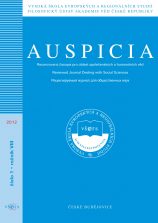Represoři a jejich subjektivní pohled na regulaci vlastních emocí
Repressors and Their Subjective View of Regulating Their Own Emotions
Author(s): Beata PrykováSubject(s): Psychology, Personality Psychology, Psychoanalysis, Studies in violence and power
Published by: Vysoká škola evropských a regionálních studií, z. ú.
Keywords: regulation of emotions; coping; repressive coping style;
Summary/Abstract: From the evolutionary point of view, emotions are very valuable for us because they coordinate our reactions to situations. Emotion regulation includes both an increase and a reduction of negative or positive emotions. A term related to emotion regulation is „coping“ but coping differs in its primary focus - it focuses on the reduction of a negative emotion experienced in a longer interaction of body and the environment (in a so-called emotional episode). An equivalent term in the Czech language is „zvládání zátěže“, but the English original is commonly used in specialised literature. Often mentioned in relation to coping is the so-called repressive coping style which is characterised as an unconscious denial of the experienced distress. The typical repressor usually interprets a stress situation as only half as serious as it really is in order to perceive himself / herself as an unshakeable and emotionally stable being. The repressor mainly focuses on external keys and strives to make the best possible impression in his / her social surroundings.
Journal: Auspicia
- Issue Year: 2009
- Issue No: 2
- Page Range: 151-153
- Page Count: 3
- Language: Czech

